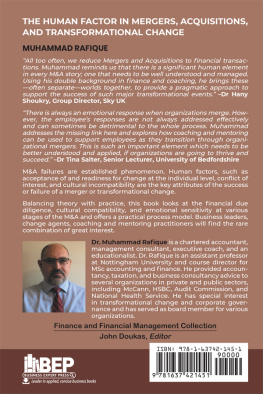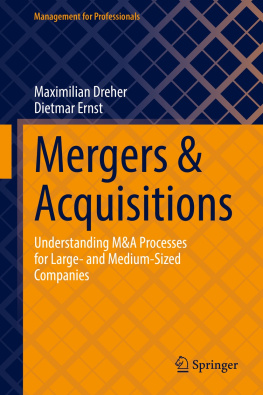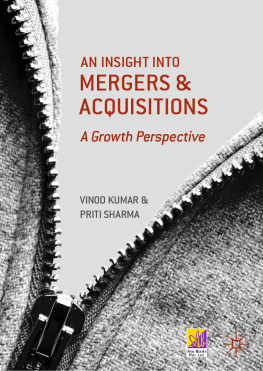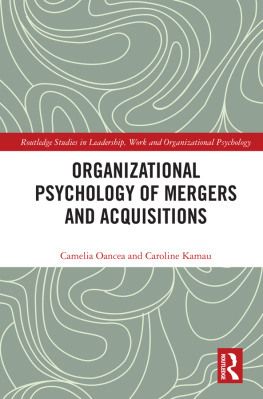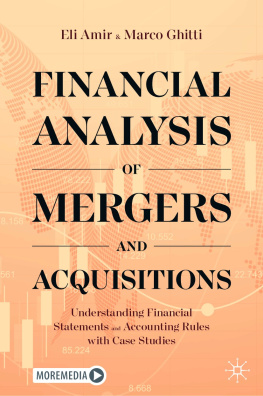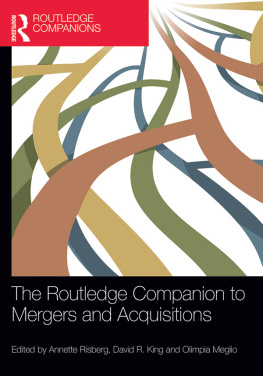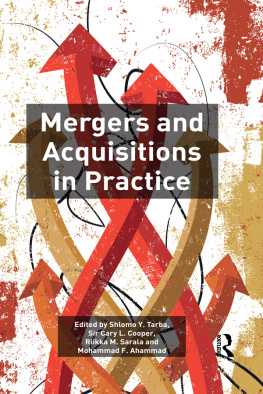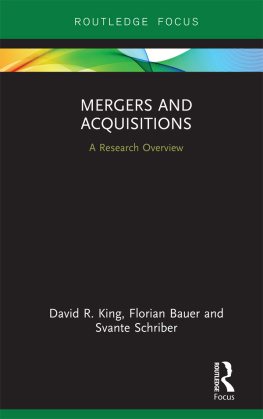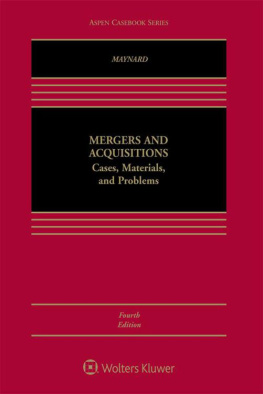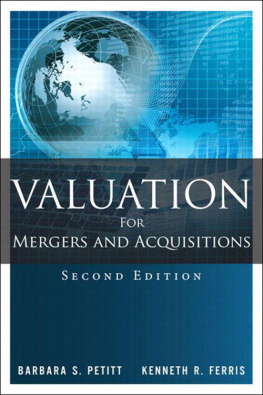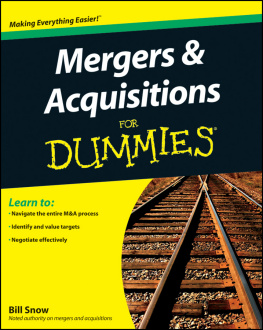Muhammad Rafique - The Human Factor in Mergers, Acquisitions, and Transformational Change
Here you can read online Muhammad Rafique - The Human Factor in Mergers, Acquisitions, and Transformational Change full text of the book (entire story) in english for free. Download pdf and epub, get meaning, cover and reviews about this ebook. year: 2021, publisher: Business Expert Press, genre: Business. Description of the work, (preface) as well as reviews are available. Best literature library LitArk.com created for fans of good reading and offers a wide selection of genres:
Romance novel
Science fiction
Adventure
Detective
Science
History
Home and family
Prose
Art
Politics
Computer
Non-fiction
Religion
Business
Children
Humor
Choose a favorite category and find really read worthwhile books. Enjoy immersion in the world of imagination, feel the emotions of the characters or learn something new for yourself, make an fascinating discovery.
- Book:The Human Factor in Mergers, Acquisitions, and Transformational Change
- Author:
- Publisher:Business Expert Press
- Genre:
- Year:2021
- Rating:5 / 5
- Favourites:Add to favourites
- Your mark:
- 100
- 1
- 2
- 3
- 4
- 5
The Human Factor in Mergers, Acquisitions, and Transformational Change: summary, description and annotation
We offer to read an annotation, description, summary or preface (depends on what the author of the book "The Human Factor in Mergers, Acquisitions, and Transformational Change" wrote himself). If you haven't found the necessary information about the book — write in the comments, we will try to find it.
Muhammad Rafique: author's other books
Who wrote The Human Factor in Mergers, Acquisitions, and Transformational Change? Find out the surname, the name of the author of the book and a list of all author's works by series.
The Human Factor in Mergers, Acquisitions, and Transformational Change — read online for free the complete book (whole text) full work
Below is the text of the book, divided by pages. System saving the place of the last page read, allows you to conveniently read the book "The Human Factor in Mergers, Acquisitions, and Transformational Change" online for free, without having to search again every time where you left off. Put a bookmark, and you can go to the page where you finished reading at any time.
Font size:
Interval:
Bookmark:

The Human Factor in Mergers, Acquisitions, and Transformational Change
The Human Factor in Mergers, Acquisitions, and Transformational Change
Muhammad Rafique

The Human Factor in Mergers, Acquisitions, and Transformational Change
Copyright Business Expert Press, LLC, 2022.
Cover design by Charlene Kronstedt
Interior design by Exeter Premedia Services Private Ltd., Chennai, India
All rights reserved. No part of this publication may be reproduced, stored in a retrieval system, or transmitted in any form or by any meanselectronic, mechanical, photocopy, recording, or any other except for brief quotations, not to exceed 400 words, without the prior permission of the publisher.
First published in 2021 by
Business Expert Press, LLC
222 East 46th Street, New York, NY 10017
www.businessexpertpress.com
ISBN-13: 978-1-63742-145-1 (paperback)
ISBN-13: 978-1-63742-146-8 (e-book)
Business Expert Press Finance and Financial Management Collection
Collection ISSN: 2331-0049 (print)
Collection ISSN: 2331-0057 (electronic)
First edition: 2021
10 9 8 7 6 5 4 3 2 1
Description
Mergers and Acquisitions have been used for many decades to improve efficiency, value generation, cost savings, and increasing market share. However, historically, 70 to 90 percent of these mergers and acquisitions fail or fail to achieve the holistic objectives. Over ambitious management, lack of strategic oversight, inaccurate valuation, unforeseen economic factors, and mishandling of integration obstacles generally lead to merger or acquisition failures. In this book, we focus on integration obstacles, specifically human emotions, and postmerger resource management. Dedicated staff are an invaluable asset for any organization but when the uncertainty caused by potential change such as merger, acquisition, or restructuring creeps in, the performance is significantly impacted. Senior management focus on organizational challenges and staff feel neglected, under-valued, and ill-informed or even worse, misinformed. In some cases, experienced staff members leave the organization and the management is expected to deliver change with inexperienced and unmotivated staff, leading to laying the foundations of a failed merger. This book offers: early warnings to business leaders; tried and tested strategies to keep staff onboard during all stages of organizational change; empathically addressing staff members fears and emotional issues; and a practical guide to integrate resources. This book is an adaptation of the doctoral thesis titled: The role of coaching and mentoring in transformational change, focusing on housing association mergers. Anonymized real-life accounts of staff members working at various levels within the organizations as well as the experiences of external gurus, trainers, and coaches involved in delivering organizational change are included. To aid organizational leaders tasked with delivering organizational change, case studies, exercises, and a unique Coachs Corner summarizing each preceding chapter and providing specific suggestions for leadership development are included from for profit as well as not for profit sectors. We believe that no such practical guide currently exists in the literature. The audience for our book includes business leaders, change agents, staff members facing organizational restructuring, business coaches, mentors, and ambitious managers considering transitioning into leadership positions.
Keywords
emotional sensibility during M&A; transformational change; merger process model; merger and acquisition failures; cultural compatibility; leadership development; cross-organizational mentoring; confidence coaching; staff integration
Contents
All too often, we reduce Mergers and Acquisitions to financial transactions. (Muhammad) reminds us that there is a significant human element in every M&A story; one that needs to be well understood and managed. Using his double background in finance and coaching, he brings theseoften separateworlds together, to provide a pragmatic approach to support the success of such major transformational events.Dr. Hany Shoukry, Group Director, Sky UK
There is always an emotional response when organisations merge, even when the driving factor is financial so that jobs can be retained. However, the employees responses are not always addressed effectively and can sometimes be detrimental to the whole process. Muhammad addresses the missing link here and explores how coaching and mentoring can be used to support employees as they transition through organisational mergers. This is such an important element which needs to be better understood and applied, if organisations are going to thrive and succeed.Dr. Tina Salter, Senior Lecturer, University of Bedfordshire
This book is an indispensable resource for anyone involved in dynamics of transformational change. It provides a unique in-depth perspective on the processes within mergers and acquisitions as being affected by intricate essence of human behavior. The lessons learned and explicated by this guide would help practitioners to deconstruct and master the complex mechanics of organizational change.Dr. Alex Avramenko, Professor of Business and Management, Abertay University, UK
Merger and acquisition failures are established phenomena. The failure rates vary according to some analysts, scholars, and researchers. Statistics show that approximately 50 percent of all mergers and acquisitions fail to achieve the intended results (William 2005). The failure rate of merged firms in creating value and meeting their desired financial or strategic objectives is even higher. Marks and Mirvis (2010) point out that roughly 70 to 75 percent of corporate partnerships failed, whereas the failure rate as per Christensen et al. (2011) is 80 to 90 percent. Therefore, statistically every other merger is doomed for failure.
Consistent merger failures have provided scholars with abundance of data and different theories have been developed. Seo and Hill (2005) identify six theories to explain the problems in managing mergers and acquisitions: anxiety theory, social identity theory, acculturation theory, role conflict theory, job characteristic theory, and organizational justice theory. In addition to the evidence-based academic literature, there are various practical guides, models, and toolkits developed by practitioners, gurus, and consultants to help and support the senior management teams involved in the merger process. This book adds to the body of academic and practitioners literature by highlighting the impact of human emotions on the success and failure of a merger. Historically, lessons from merger failures have not been learnt and same mistakes have been repeated time and again in various settings.
If senior executives responsible for initiating and managing mergers are not changing their strategies in the presence of all the resources available to them, what is the point of another book? This is a genuine question. The purpose of this book is not to offer a tick box flow chart, step by step guide or a management mantra for merger success. Instead, the importance of human factors in the management of mergers is discussed with specific reference to the theories that highlight staff-related problems in the management of mergers. Workplace learning theories relating to the desirability and acceptability of the need for transformational changes are also reviewed.
Font size:
Interval:
Bookmark:
Similar books «The Human Factor in Mergers, Acquisitions, and Transformational Change»
Look at similar books to The Human Factor in Mergers, Acquisitions, and Transformational Change. We have selected literature similar in name and meaning in the hope of providing readers with more options to find new, interesting, not yet read works.
Discussion, reviews of the book The Human Factor in Mergers, Acquisitions, and Transformational Change and just readers' own opinions. Leave your comments, write what you think about the work, its meaning or the main characters. Specify what exactly you liked and what you didn't like, and why you think so.

